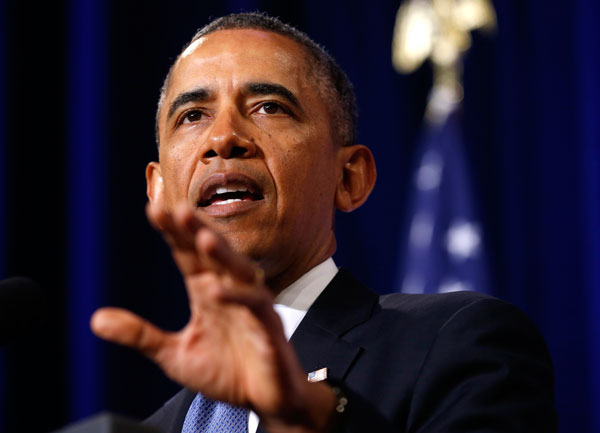Obama bans spying on leaders of US allies, scales back NSA program
Updated: 2014-01-18 01:25
(Agencies)
|
||||||||
|
 |
|
US President Barack Obama speaks about the National Security Agency from the Justice Department in Washington January 17, 2014. [Photo/Agencies] |
President Barack Obama announced a ban on US eavesdropping on the leaders of close friends and allies on Friday, and rein in the vast collection of Americans' phone data in a series of reforms triggered by Edward Snowden's revelations.
In a major speech, Obama took steps to reassure Americans and foreigners alike that the United States will take into account privacy concerns that arose after former US spy contractor Snowden's damaging disclosures about the large monitoring activities of the National Security Agency.
Obama promised that the United States will not eavesdrop on the heads of state or government of close US friends and allies, which a senior administration official said would apply to dozens of leaders.
The step was designed to smooth over frayed relations between, for example, the United States and Germany after reports surfaced last year that the NSA had monitored the mobile phone of German Chancellor Angela Merkel.
Among the list of reforms, Obama called on Congress to establish an outside panel of privacy advocates for the secret Foreign Intelligence Surveillance Court that considers terrorism cases.
While the speech was designed to address concerns that US surveillance has gone too far, Obama's measures were limited.
One of the biggest changes will be an overhaul of the government's handling of bulk telephone "metadata."
In a nod to privacy advocates, Obama decided that the government should not hold the bulk telephone metadata, a decision that could frustrate some intelligence officials.
In addition, he ordered that effectively immediately, the US government will take steps to modify the program so that a judicial finding is required before the database is queried.
Obama also decided that communications providers would be allowed to share more information with the public above government requests for data.
While a presidential advisory panel had recommended that the bulk data be controlled by a third party such as the telephone companies, Obama did not plan to offer a specific proposal for who should store the data in the future.
Obama has asked Attorney General Eric Holder and the intelligence community to report back to him before the program comes up for reauthorization on March 28 on how to preserve the necessary capabilities of the program, without the government holding the metadata.
Administration officials will consult relevant committees in Congress on how to best handle the material.
Obama is balancing public anger at the disclosure of intrusion into Americans' privacy with his commitment to retain policies he considers critical to protecting the United States.

 Obama bans spying on leaders of US allies
Obama bans spying on leaders of US allies
 Bunnies on parade to celebrate 60 yrs of Playboy
Bunnies on parade to celebrate 60 yrs of Playboy
 Chipmunk fit to burst as it stuffs peanuts into mouth
Chipmunk fit to burst as it stuffs peanuts into mouth
 Wildfire out of control in Los Angeles, US
Wildfire out of control in Los Angeles, US
 Bull-taming festival kicks off in India
Bull-taming festival kicks off in India
 Way to art school
Way to art school
 'American Hustle,' 'Gravity' lead Oscar nominations
'American Hustle,' 'Gravity' lead Oscar nominations
 138th Westminster Kennel Club Dog Show to open
138th Westminster Kennel Club Dog Show to open
Most Viewed
Editor's Picks

|

|

|

|

|

|
Today's Top News
Tencent's Ma tops China rich list
Obama bans spying on leaders of US allies
US seeks nonexistent threat
Li delivers economic reform vow
Pressure rises on treating pollution
Beijing wants to attract more foreign experts
Dumpling appetites grow after Xi drops in
Looming baby boom no sweat: officials
US Weekly

|

|





